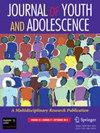Cumulative Dopaminergic Genetic Effects on Empathy Development in Emerging Adults.
IF 3.6
1区 心理学
Q1 PSYCHOLOGY, DEVELOPMENTAL
引用次数: 0
Abstract
Empathy plays a critical role in helping emerging adults understand others' emotions, build meaningful connections, and navigate new environments. This study explores the influences of cumulative genetic effects within the dopaminergic pathway on the development of empathic traits and situational empathic responses in emerging adults. Study 1 employed a cross-sectional design with university students (N = 1067, mean age = 19.83 ± 1.63 years) to examine the relationship between the cumulative genetic effects (measured as a weighted genetic score by combining polymorphisms and protective alleles linked to positive psychological traits) and individual differences in empathic traits. Results indicated that the higher genetic scores were significantly associated with greater cognitive and emotional empathy. Study 2 utilized a three-wave longitudinal design over a six-month interval with freshmen (N = 315, mean age = 18.7 ± 0.49 years). This study assessed whether the cumulative genetic effects predicted changes in empathic traits over time. Results showed that the higher genetic scores consistently predicted greater cognitive and emotional empathy at each measurement point. Study 3 used an observational experiment with university students (N = 377, mean age = 24.44 ± 1.733 years) to evaluate situational empathic responses to the misfortune of a dialysis patient. Participants with the higher genetic scores exhibited stronger empathic responses in this context. Together, these findings highlight the significant roles of cumulative genetic effects within dopaminergic pathway in shaping both stable empathic traits and situational empathic responses in emerging adulthood.累积多巴胺能基因对初生成人共情发展的影响。
同理心在帮助新成人理解他人情绪、建立有意义的联系和适应新环境方面起着至关重要的作用。本研究探讨了多巴胺能通路内的累积遗传效应对初生成人共情特征和情境共情反应发展的影响。研究1采用横断面设计,以大学生为研究对象(N = 1067,平均年龄= 19.83±1.63岁),考察累积遗传效应(通过结合多态性和与积极心理特质相关的保护性等位基因加权遗传评分)与共情特质个体差异之间的关系。结果表明,较高的遗传分数与更强的认知和情感共情显著相关。研究2采用为期6个月的三波纵向设计,研究对象为新生(N = 315,平均年龄= 18.7±0.49岁)。这项研究评估了累积的遗传效应是否能预测移情特征随时间的变化。结果表明,在每个测量点上,较高的基因分数一致地预示着更强的认知和情感同理心。研究3采用观察性实验(N = 377,平均年龄= 24.44±1.733岁),评估透析患者遭遇不幸时的情境共情反应。在这种情况下,基因得分较高的参与者表现出更强的共情反应。综上所述,这些发现强调了多巴胺能通路内的累积遗传效应在形成成年初期的稳定共情特征和情境共情反应中的重要作用。
本文章由计算机程序翻译,如有差异,请以英文原文为准。
求助全文
约1分钟内获得全文
求助全文
来源期刊

Journal of Youth and Adolescence
PSYCHOLOGY, DEVELOPMENTAL-
CiteScore
8.20
自引率
6.10%
发文量
155
期刊介绍:
Journal of Youth and Adolescence provides a single, high-level medium of communication for psychologists, psychiatrists, biologists, criminologists, educators, and researchers in many other allied disciplines who address the subject of youth and adolescence. The journal publishes quantitative analyses, theoretical papers, and comprehensive review articles. The journal especially welcomes empirically rigorous papers that take policy implications seriously. Research need not have been designed to address policy needs, but manuscripts must address implications for the manner society formally (e.g., through laws, policies or regulations) or informally (e.g., through parents, peers, and social institutions) responds to the period of youth and adolescence.
 求助内容:
求助内容: 应助结果提醒方式:
应助结果提醒方式:


